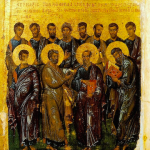Of Whether the Body of Christ Hath a Butt
As discussed before, during Year B, the Gospel of John is slightly more often selected for Sunday reading due to Mark’s brevity. Our topical character for the Easter II Gospel reading is St. Thomas—no, not the Cherubic Doctor1; I am sorry, Thomists, but he’s not in the Bible. I’m talking about the apostle, the one who later went to India, according to a persistent and by no means incredible legend.2
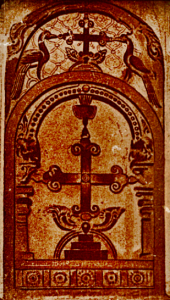
A 10th cent. cross from India. Note the dove
on top and the lotus beneath, common traits
of the Mar Thoma slīva (“St. Thomas cross”)
or Nasrani Menorah (“Nazarene Menorah”).
Ever since I was a child, I’ve felt sorry for St. Thomas. Christians treat him as the perennial butt of a joke that I find a little unfair, and used to consider monstrously unfair. This man was one of the original Twelve, a missionary, a martyr; when Jesus was returning to Judæa, despite clear danger to his life there, Thomas is the one who reputedly said, not “Let us also go, that we may protect him” (like Peter), but “Let us also go, that we may die with him.” And he is remembered, two thousand years after one lapse, a lapse over what’s probably the hardest miracle to accept,3 as Doubting Thomas. I imagine the vision of the face of God makes up for it at least a little bit, but aside from that, rough deal!
To their credit, if his fellow Apostles thought of St. Thomas as the butt of a joke, they don’t seem to have left any trace of it in the New Testament. (If there is a singular butt of the Gospels, it’s probably St. Peter—and according to tradition, this is somewhat at his own behest, since Mark is no more merciful to him than the other evangelists!)
But a part of this pity needs to be reprimanded. That part is, really, barely-concealed self-pity.
“So Afraid of Being Taken In That They Cannot Be Taken Out”
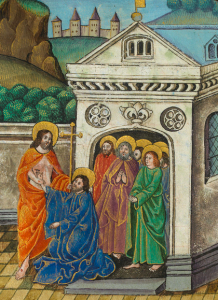
“The Incredulity of St. Thomas” depicted in
an early 16th cent. English manuscript.
I dare say most religious people struggle with doubt at one time or another; I have rarely been free of it; I’ve learned, for the most part, not to worry about it, but I used to worry very much about whether God really did exist and (if so) whether Christianity really had got him right. Now, I have a weird mental block about doing or wanting pleasant things on my own behalf, but said block allows me to do and want them for other people freely. Hence, pitying Thomas’s distrust serves nicely as a proxy for pitying my own. C. S. Lewis’s excellent essay “On Obstinacy in Belief” has this to say about faith in general, and St. Thomas in particular (this passage is abridged):
The scientist has beliefs about his wife and friends which he holds, not indeed without evidence, but with more certitude than the evidence, if weighed in the laboratory manner, would justify. If, for the first time, a doubt of his wife’s fidelity crosses the scientist’s mind, does he consider it his duty at once to entertain this doubt with complete impartiality, at once to evolve a series of experiments by which it can be tested, and to await the result with pure neutrality of mind? No doubt it may come to that in the end. There are unfaithful wives; there are experimental husbands. But is such a course what his brother scientists would recommend as the first step he should take and the only one consistent with his honor as a scientist? Or would they, like us, blame him for a moral flaw rather than praise him for an intellectual virtue if he did so?
… When you are asked for trust you may give it or withhold it; it is senseless to say that you will trust if you are given demonstrative certainty. There would be no room for trust if demonstration were given. When demonstration is given what will be left will be simply the sort of relation which results from having trusted, or not having trusted, before it was given.
The saying “Blessed are those that have not seen and have believed” has nothing to do with our original assent to the Christian propositions. It was not addressed to a philosopher enquiring whether God exists. It was addressed to a man who already believed that, who already had long acquaintance with a particular Person, and evidence that that Person could do very odd things, and who then refused to believe one odd thing more, often predicted by that Person and vouched for by all his closest friends. It is a rebuke not to skepticism in the philosophic sense but to the psychological quality of being “suspicious.” It says in effect, “You should have known me better.”
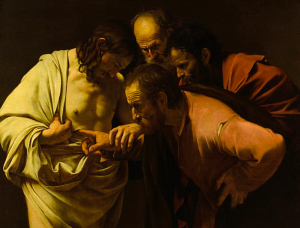
The Incredulity of St. Thomas by Caravaggio,
c. 1602—that rare thing, a realistic painting
that I actually like!
St. Thomas’s case was, obviously, still curable! But it’s essentially the same illness as that of the faithless Dwarfs from The Last Battle. Aslan diagnoses their self-imposed inability even to perceive the heaven they have entered:
They will not let us help them. They have chosen cunning instead of belief. Their prison is only in their own minds, yet they are in that prison; and so afraid of being taken in that they cannot be taken out.
The Other Kind of Pity
But I said that a part of my pity merited rebuke—also, that I used to consider the joke more unfair than I do now. One reason I do also partly defend those things is that I doubt most of us would do better in his shoes. But there is another reason.
I have kept thinking about St. Thomas, off and on, for many years now. During the last few, it came to me how horribly lonely he must have been, that first week of the first Easter. Perhaps he did feel like the butt of a joke, with every other disciple maintaining by the end of Sunday that no, Jesus really was alive again, even if they couldn’t produce the untamed Lion on demand. Or he may have felt that they had just all gone completely crazy. But no matter what else he felt, he was the only person still in mourning for Jesus. Grief is an isolating thing; one of the only things that lessens it is company. The only people who might have been expected to share the burden were his fellow disciples, but how ghastly would it have felt to be with them? I half-suspect the reason he was only present to meet Jesus “after eight days” may have been that it took one (or more) of the other Apostles that long to talk him around to even visiting them again.

Part of the Cenacle in Jerusalem, built on a
site held by Christians since the 4th cent. to
be the location of the Upper Room. Photo
by Ranveig Thattai, 2007 (source).
Notice, too, that Jesus’ rebuke of St. Thomas—while it is plainly a rebuke—is amazingly gentle. It has the same old sense of a mocking smile in Jesus’ voice, which you can hardly keep out of most of the things he says. But the mockery is (forgive what will be a pun) ribbing, not sneering; and the rebuke itself is nothing like the vade retro with which Peter is rebuffed in Matthew 16. In fact, technically, the rebuke is never even stated outright, only implied. Maybe Jesus felt that that week of self-imposed but real anguish was plenty of penance by itself.
John 20.19-31, RSV-CE
On the evening of that day, the first day of the week,a the doors being shut where the disciples were, for fear of the Jews, Jesus came and stood among them and said to them, “Peace be with you.”b When he had said this, he showed them his hands and his side.c Then the disciples were gladd when they saw the Lord.e Jesus said to them again, “Peace be with you. As the Father has sent me, even so I send you.” And when he had said this, he breathed onf them, and said to them, “Receive the Holy Spirit. If you forgiveg the sins of any, they are forgiven; if you retainh the sins of any, they are retained.”
Now Thomas, one of the twelve, called the Twin,i was not with them when Jesus came. So the other disciples told him, “We have seen the Lord.” But he said to them, “Unless I see in his hands the print of the nails, and place my finger in the mark of the nails, and place my hand in his side, I will not believe.”
Eight days later,j his disciples were again in the house, and Thomas was with them. The doors were shut, but Jesus came and stood among them, and said, “Peace be with you.” Then he said to Thomas, “Put your finger here, and seek my hands; and put out your hand, and place it in my side; do not bel faithless, but believing.”m Thomas answered him, “My Lord and my God!” Jesus said to him, “Have you believed because you have seen me? Blessed are those who have not seen and yet believe.”
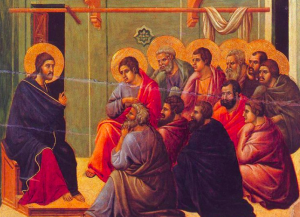
Christ taking leave of the Apostles by
Duccio di Buoninsegna, c. 1310.
Now Jesus did many other signs in the presence of the disciples,n which are not written in this booko; but these are written that you may believe that Jesus is the Christ,p the Son of God, and that believing you may have life in his name.
John 20.19-31, my translation
Then, that being the evening of the first day of the week,a and the doors closed where his students were out of fear of the Jews, Jesus came and stood in their midst, and said to them: “Peace to you.”b And having said this, he showed his hands and his sidec to them. Then his students were overjoyedd to see the Lord.e Then Jesus told them further: “Peace to you; just as my Father sent me, I too send you.” And having said this, he blew onf them and told them: “Receive the Holy Spirit; if you remitg anyone’s sins, they are remitted to them; if you hold ontoh anyone’s sins, they are held onto.”
Now, Thomas, one of the twelve, called the Double,i was not among them when Jesus came. Then the other students told him: “We have seen the Lord.” But he told them: “Unless I see in his hands the mark of the nails and put my finger in the mark of the nails and put my hand into his side, I will not believe.”
And after eight days,j a further time his students were inside, and Thomas was among them. Jesus came in with the doors closed and stood in the midst of them, and said: “Peace to you.” Then he said to Thomas, “Bring your finger over here and lookk at my hands, and bring your hand and put it into my side, and do not bel unbelieving, but believing.”m Thomas replied and said to him: “Oh my Lord and my God.” Jesus said to him: “Now you have seen me, you have believed? Blessed are those who, not seeing, yet believe.”
Now then, Jesus did many other signs also, face-to-face with his students,n which are not written in this booko; these have been written so that you might believe that Jesus is the anointed,p the Son of God, and in order that, believing, you might have life in his name.
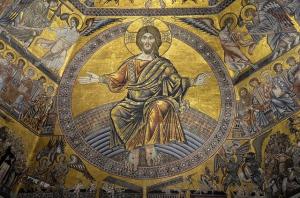
Mosaic of Christ enthroned from the octagonal
dome of the Baptistry of St. John (constructed
1059-1128) in Florence, Italy.
Textual Notes
a. the first day of the week: A hyper-literal rendering would say “on the one of sabbaths”; cf. note e in this post for a short discussion of the idiom here.
b. Peace be with you/Peace to you: He probably said shalom ‘aleikhem [shalowm ȝaleykhem—שָׁלוֹם עֲלֵיכֶם], which means “peace unto you [pl.],” and has long been used in Hebrew as a greeting (often shortened just to shalom).
c. side: I agree with the RSV that “side” is the best translation to convey the same breadth as the Greek term. However, I note with interest that an alternative translation would be “rib” (this being the forewarned pun).
d. were glad/were overjoyed: The rationale for this difference is slim. A more traditional rendering than mine or the RSV’s would be “rejoiced.” That’s nice; it is an active verb, like the Greek; I only decided against it as too archaic. However, I did want a verb with the stem joy in it, since the Greek has the equivalent. What’s less defensible is the choice of “overjoyed”: it intrudes a preposition Greek does have but doesn’t attach to this verb (and Greek does regularly compound verbs with prepositions, just like English, so there’s no getting away with it on that technicality). I decided to use “overjoyed” on the grounds that it seems like the only fully vernacular word that has that stem; but I readily admit, this choice is open to technical critique on exactly the premises I’ve adopted.
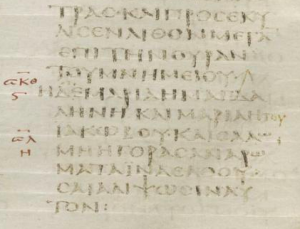
e. the Lord: As I mentioned in another post, the word “lord” is something of an oddity in English. Its equivalents in many languages are also the equivalents of the polite direct address “sir,” but in English, sir and lord belong to very different levels and kinds of ceremony.
The reason that kürios [κύριος], “lord,” became a divine title in Greek (and thence in Latin and so other European languages) is that it was chosen by the Septuagint as the translation of the Hebrew title adonai [‘adhownay—אֲדוֹנָי], meaning “my lord.” This itself gained prominence as a vocal substitute for the Tetragrammaton, used by cantors or lectors where the text actually had the divine Name. (Adonai is still used for this purpose today, though other options include pausing briefly in silence and saying ha Shem, which means “the Name.”) This is why, in many Christian Old Testaments, you will often find “the LORD” with small capitals instead of lower-case letters: these represent occurrences of the Tetragrammaton, while instances that read “the Lord” in ordinary case setup represent the word adonai itself.
f. breathed on/blew on: The verb here is emphüsaō [ἐμφυσάω]. Now, this word may have evolved to be as simple as “breathed on”; I don’t know. However, I have a hunch that this is one of the many cases of translators feeling more dignified than Scripture—if I’m wrong about that, I’ll have to owe them an apology. I can say with certainty that, if the etymology is an index of the word’s meaning (which may or may not be true), it meant something rather more forceful than the gentle, mystical-sounding sufflations of earlier Catholic ritual; the root of the verb is the noun phüsa [φῦσα], whose primary meaning was “[a set of] bellows.”

As in “what makes this instrument the size of
a small house work.” This pipe organ is from
Erfurt, Germany; photo by Edwin Meier, 2017
—used under a CC BY-SA 3.0 license (source).
g. forgive/remit: I’d actually prefer the term “forgive” here, given my ‘druthers. Remit and absolve both sound a little clinical in English (in my opinion); pardon is better, but for some reason I really like the v-sound, which it hasn’t got. Unfortunately, the verb here, aphiēmi [ἀφίημι], is one of those words that doesn’t quite play nicely with my translation method. Its base meaning is “to send/put/throw [away/from]”: exactly the kind of idea-range that gets picked up for lots and lots of idioms, so that aphiēmi has several incompatible senses. Sins, by being forgiven, are “put away from” the culprit, but equally, someone in exile has been “sent from” their previous residence; the same verb could apply to a diplomat, or a soldier who has just been mobilized, or one who has just been demobilized—you get the picture. I did try, but for the life of me, I could not think of a unitary English equivalent with the right range of meanings to render aphiēmi. I settled on “remit” as being similar, in sound and etymology, to “emit,” another translation for aphiēmi that could be used in a few contexts.
I’d have liked to comment further on this verse. The power to forgive and to retain sins which we see committed to the Apostles here (via a separate bestowal of the Holy Ghost than that given to the Church as a whole at Pentecost) is the basis of much of the Catholic doctrine of the priesthood, especially of its role in sacramental confession. However, this post is long (and late!) even now after I’ve cut stuff; I need to include an important follow-up post, as soon as I can manage; and the New Testament ain’t exactly short of references to forgiveness! So we’ll shelve this one for the present.

h. retain/hold onto: This verb caught me off-guard. It is derived from a noun (kratos [κράτος]) meaning “strength, power.” Our words ending in –cracy get that suffix indirectly from kratos, and the Greek word for “self-control” is enkrateia [ἐγκράτεια], which means roughly “self-mastery” but could almost be rendered “inner strength.” In any event, the verb at its most literal would be “to exert strength or force [upon something]”; from here (via “to conquer”) it came to mean “to seize, hold.”
i. Twin/Double: Didümos [Δίδυμος], or in Latin form Didymus, came from the basic Greek word for “two,” düo [δύο]. The English twin is therefore a great translation, on those etymological grounds I so like to make a meal of. But, one of my goals in offering a second translation is to illuminate as much of the scripture as I can, so I’m not above being different for its own sake, if that in fact facilitates a deeper study of the text. And in fact, Didümos is a little bit broader in scope than the English “twin” usually bears. When we say that someone’s lookalike is “their twin” in English, it’s metaphorical; the Greek term simply covers both ideas (and may have something of the doppelgänger to it as well, I can’t tell).

The reputed grave of St. Thomas the Apostle,
located in Mylapore, India. Photo by Mathen
Payyappilly Palakkappilly (2013), used under
a CC BY-SA 3.0 license (source).
Curiously, we seem at some point to have lost track of the fact that Didümos is a translation of the Aramaic name T’owma’ [תְּאוֹמָא], while Thōmas [Θωμᾶς] was simply an adaptation of T’owma’ to Greek habits of pronunciation. In other words, this means that Didymus was (probaly) not one of those nicknames God seems to so like giving people; it was just Thomas’s name, in translation. St. Thomas likely had a literal twin—presumably an elder brother, which might explain his getting this name, which hits a little like “Junior.”
j. Eight days later/And after eight days: Since this is typically represented as also taking place on a Sunday, that eight may throw some readers. The thing to remember is that the ancients used inclusive counting (that’s why Jesus was “in the tomb for three days” in their parlance, even though we’d say he was in the tomb for a little more than one whole day).
k. Put your finger here, and see/Bring your finger over here and look: The original text wins once again in sheer vividness! (Apparently Jesus didn’t subscribe to the “See with your eyes, not with your hands” rule, though if you decide to tell this to your children, I disclaim all responsibility.)
l. be: This tiny word merits mention because it highlights something rather interesting about the English language.
We make a return to language …
Most languages have equivalents of the English verbs to be and to become; the Greek equivalents are eimi [εἰμί] and ginomai [γίνομαι], respectively. However, some other languages, Greek included, get more use out of the word for “become” than we do.
In philosophy, for hundreds of years, there’s been a distinction between whole realms denoted by these verbs, a contrast between what is considered being proper versus the world of becoming, in which the latter encompasses everything that changes. Many people nowadays believe that everything or nearly everything changes, so the first of these contrasting categories may seem kind of useless! But even today, some of us believe that there are some things that do not change—in theory, all of mathematics and logic rest on this premise; and most forms of theism4 aver that deity, properly so-called, is above the vicissitudes of time (and we do so hate a vicissitude in this household). Accordingly, “become” is sometimes used as a being-verb when discussing things that belong to or reside in the “world of becoming,” which obviously includes human beings. So, while it would be inelegant to the point of risking confusion, it would be strictly correct to render Jesus’ words to Thomas as “do not become unbelieving, but believing.”
m. faithless … believing/unbelieving … believing: I rather dislike the RSV’s translation here, because it obliterates the relationship between the two adjectives, which is extremely simple in the Greek. Jesus tells Thomas to be not apistos [ἄπιστος], but pistos [πιστός]—and the a- there is what’s called an alpha privative, a type of negative particle. This is exactly like our contrast between “amoral” and “moral,” as well it should be, since that’s we went ahead and stole Greek’s particle there. (As Aidan Mattis of The Lore Lodge said, “English is not a language. English is four languages in a trench-coat.”)
n. in the presence of the disciples/face-to-face with his students: Here, the main contrast is just my use of slightly more literal and less traditionally-tinged vocabulary. However, I do want to highlight a fun fact: in the adverb meaning “in the presence of” or “face-to-face with,” enōpion [ἐνώπιον], derives from the root ōps [ὤψ], meaning “eye” or “face”; this root may also be present in the name of Zeus’ consort Europa, and it was long associated with the name of Odysseus’ shrewd bride, Penelope: since one word for “thread” is pēnē [πήνη], this was taken to be an allusion to her brilliance in weaving.5

I can neither confirm nor deny that this
tidbit was horned in so I’d have a pretext
to include Penelope and the Suitors by
John William Waterhouse (1911-1912).
o. this book: It is of course not known for certain, but one idea that’s been put forward for why John is so different from the Synoptics is that he may have known about, and perhaps even read, one or more them. It is almost universally agreed to be the latest of the bunch, and most datings have a gap of at least a decade between the latest Synoptic and the Fourth Gospel—plenty of time for copies of all three to have been made and become familiar to the author of John.
p. the Christ/the anointed: Christ is one of the large handful of “Grenglish” words we have through Christianity—alongside apocalypse, apostle, baptize, Bible, blaspheme, canon, cathedral, catholic, deacon, eucharist, homily, mystery, parable, presbyter, type, zeal, and many more; even, if at greater removes, bishop, church, devil, parish, and priest.
The reason “the anointed” or “Christ” it is such a favored title in the New Testament lies in the fact that anointing, rather than e.g. crowning or investiture,6 was the traditional Hebrew way of marking major figures in public life. Traditionally, the splendid anointing of the king from a horn was the most magnificent; the high priest and the crown prince were anointed too, and so in many cases were prophets and lesser priests.

The prophet Zechariah as depicted by James
Tissot (date unspecified, but between 1885
and 1902).
In particular, ho Christos [ὁ Χριστός] translated ha-Mashiyach [הַ־מָשִׁיחַ] with reference to the anointed one, the Mashiyach ben Dawidh or “Anointed Son of David.” Messianism started out as something of a fringe belief in Judaism, and the details of the Messiah were widely disputed at the time—it wasn’t even clear how many messiahs should be expected. Based on a passage in Zechariah, at least some schools of thought anticipated four messianic figures: Elijah, who would herald the messianic period; a Mashiyach ben Yoseph (“son of Joseph”—funny coincidence, that), who would fight and die to defeat Israel’s enemies; the Mashiyach ben Dawidh, who would reign in peace and glory and resurrect the dead; and a Righteous Priest, about whom speculation seems to have been minimal since the ruin of the Second Temple, possibly earlier.7 Regardless, many varieties of Judaism professed an expectation of a messiah; and the basic claim of the Church, since her earliest documents were written, has been that Jesus was and is the fulfillment of the promises of Scripture, even though often on a different plane than many first-century Jews expected or wanted.
Link to aforementioned important follow-up post to follow.
Footnotes
1I prefer to specify when I mean the Cherubic Doctor: “the Angelic Doctor” could mean either St. Thomas Aquinas or his Franciscan friend, St. Bonaventure. If you haven’t heard of Bonaventure, he’s one of the finest mystics of the Franciscan tradition (which tends to embody the Platonic channel of Christian thought more than the Aristotelian), and was given the title of the Seraphic Doctor, comparing him to the highest of the nine choirs. Apropos of nothing, I imagine both saints were less passive-aggressive than I am.
2Some people scoff at the notion of St. Thomas traveling to India, but I really don’t see why. Mediterraneans had been visiting India regularly since the Bronze Age; there had even been a Jewish settlement at Cochin since the first century BC! Nor would language be much of a barrier: if you spoke Greek, as many Palestinian Jews did, there were Greek-speaking populations scattered between the Caspian Sea and northern India (relicts of Alexander’s conquests); if you spoke Aramaic, even better, that it was the official lingua franca of the Persian Empire. To this day, the churches of India’s native Mar Thoma tradition use Syriac, a variety of Aramaic, as their liturgical language—the phrase Mar Thoma means “Saint Thomas” in Aramaic.
3As far as I can tell, its only real rival for this title is the doctrine of transubstantiation.
4I’m basing this “most” on the fact that—as far as I understand each of these traditions—it applies to Bahá’í, Caodaism, nearly all forms of Christianity, Deism, the Druze faith, Hinduism, Islam, Judaism, Mandæism, Sikhi, Yazidism, and Zoroastrianism. I’m pretty sure that makes up both an overwhelming majority of the world’s population, and at least a majority of the world’s theists! (As for the religions I’ve left out: I don’t understand the many forms of Buddhism or the principles of Confucianism and Daoism enough to say if they share this understanding; of the more or less entirely “non-philosophical” religions, e.g. Shinto, as far as I can tell they simply don’t raise the question.)
5Less fun, at least in my opinion, are the facts that i. this etymology doesn’t work because of the short second e and the out-of-nowhere l, and ii. the actual source of the name apparently lies with a species of duck—about as anticlimactic an origin as I can think of.
6Investiture refers to conferring an office by granting someone a symbolic piece of clothing, such as a ring or a sash (the latter, in the form of the pallium, is still used in the Catholic Church to invest metropolitan archbishops).
7I leave my readers to draw their own conclusions about what application the three disparate roles of a heroic casualty in the war against evil, a king who brings people back to life, and an eminently righteous priest could have to Jesus.



